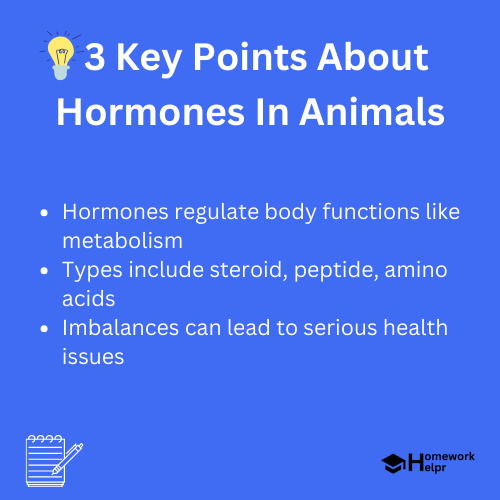📝 Summary
Hormones are crucial biochemical messengers produced by the endocrine system in animals, regulating various bodily functions. They travel through the bloodstream, allowing organs to communicate for coordination. Different glands, like the pituitary and adrenal, secrete hormones that can be classified into steroid, peptide, and amino acid-derived hormones. Their functions include regulating metabolism, growth, reproduction, and response to stress, such as cortisol’s role in managing stress. Hormonal imbalances can lead to health issues like diabetes and Cushing’s disease. The endocrine system works in concert with the nervous and immune systems, emphasizing the importance of hormones for overall health and homeostasis.
Understanding Hormones in Animals
Hormones are vital chemicals produced by the endocrine system in animals, which help regulate many of the body’s functions. These biochemical messengers travel through the bloodstream, enabling different organs and systems to communicate and coordinate their activities. Hormones play crucial roles in growth, metabolism, reproduction, and even the response to stress. Here, we’ll explore the types of hormones in animals, their functions, and the processes they regulate.
What are Hormones?
Hormones are secreted by various glands in the body, such as the pituitary, adrenal, thyroid, and pancreas. They are composed of proteins, peptides, or steroids, depending on their functions and the glands that produce them. The hormones exert their effects by binding to specific receptors on target cells, which then initiates a cascade of biochemical reactions.
Definition
Endocrine System: The system of glands that produce and secrete hormones directly into the bloodstream to regulate bodily functions.
Types of Hormones
There are several types of hormones found in animals, each with distinct roles. Below are the main categories:
- Steroid Hormones: Derived from cholesterol, these hormones include testosterone and estrogen, which are crucial for sexual development and reproduction.
- Peptide Hormones: These are made of amino acids and include hormones like insulin, which regulates blood sugar levels.
- Amino Acid Derivatives: Hormones such as adrenaline and thyroxine fall under this category, playing significant roles in metabolism and stress responses.
💡Did You Know?
Did you know that the word “hormone” comes from the Greek word “hormon,” meaning “to excite” or “to set in motion”? This reflects their crucial role in stimulating various body functions!
Functions of Hormones
Each hormone serves a specific purpose in the body, influencing various physiological processes. Here are some essential functions of hormones:
- Metabolism: Hormones regulate how the body processes nutrients and energy.
- Growth and Development: Hormones like growth hormone stimulate growth and maturation of tissues and organs.
- Reproductive Functions: Hormones control the development of reproductive organs and the regulation of the reproductive cycle.
- Response to Stress: Hormones like cortisol help manage stress and maintain homeostasis during challenging situations.
Mechanism of Hormone Action
Hormones work by binding to specific receptors on the target cells, triggering a series of reactions that lead to physiological changes. This process can be broken down into several steps:
- Release: Hormones are released into the bloodstream from their respective glands.
- Transport: The hormones travel through the circulatory system to reach their target organs or cells.
- Activation: Upon reaching their target, hormones bind to specific receptors, activating specific cellular responses.
- Response: The binding action can trigger different responses, such as altering gene expression, stimulating growth, or affecting metabolic activities.
Example
For instance, insulin is a peptide hormone released by the pancreas that lowers blood sugar levels by promoting glucose uptake in cells.
Example
Another example is cortisol, which is released by the adrenal glands in response to stress, helping to increase glucose availability in the blood.
Hormonal Imbalances
Hormonal imbalances can lead to a variety of health issues in animals. These imbalances can result from various factors, including genetics, stress, and diet. Some common disorders resulting from hormonal imbalances include:
- Diabetes: A condition where the body does not produce enough insulin, leading to high blood sugar levels.
- Hypothyroidism: Occurs when the thyroid gland does not produce enough hormones, leading to fatigue and weight gain.
- Cushing’s Disease: A condition caused by an overproduction of cortisol, leading to symptoms like obesity and skin issues.
Definition
Homeostasis: The ability of an organism to maintain stable internal conditions despite changes in the external environment.
Interplay with Other Systems
The endocrine system does not operate in isolation; it works closely with other systems, such as the nervous and immune systems. For example:
- Nervous System Interaction: Hormones respond to nerve signals. In emergencies, adrenaline is released, preparing the body for a ‘fight or flight’ response.
- Immune System Interaction: Certain hormones modulate immune responses, influencing inflammation and immunity.
Conclusion
Hormones are indispensable to the proper functioning of animals, governing a myriad of body processes from growth and metabolism to reproductive health. Understanding how hormones work and their broader interactions helps in recognizing their importance for overall health. Whether through natural circumstances or medical conditions, the balance of these biochemical messengers plays a critical role in sustaining life. Ensuring a healthy lifestyle can help maintain hormonal balance, promoting well-being in all living creatures.

Related Questions on Hormones In Animals
What are hormones?
Answer: Hormones are chemicals produced by the endocrine system that regulate various bodily functions.
What do steroid hormones do?
Answer: Steroid hormones, like testosterone and estrogen, are important for sexual development and reproduction.
What is hormonal imbalance?
Answer: Hormonal imbalance refers to an abnormal level of hormones in the body, which can lead to health issues.
How do hormones interact with other systems?
Answer: Hormones work with the nervous and immune systems, responding to nerve signals and modulating immune responses.
